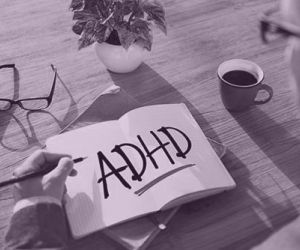Adult Attention Deficit Disorder

Adult ADHD Treatment in NYC
We've opened up new ADHD telehealth appointments!
Trifecta Health Medical Center is dedicated to helping professionals working in Manhattan area of New York City to get rapid relief of their ADD/ ADHD symptoms. Trifecta Health provides powerful psychopharmocologic intervention that is targeted and efficient and can fit into any work day, before or after normal business hours.
If you think you may need an evaluation, please take the Adult ADHD screener below ADHD Test Online
Now offering ADHD Telemedicine appointments
Skip the waiting room, receive expert treatment from the comfort of your home, and custom medication delivered to you.
1. Request Your ADHD Video Appointment
Call (212) 302-1848 or email our office at mt@trifectahealthnyc.com
2. Speak With Your Doctor Online
Speak with one of Trifecta Health's expert doctors online from your home.
3. Get Your Personalized Treatment Plan
Receive a custom treatment plan personalized for you by our expert online psychiatrists
What is adult attention deficit disorder?
Many adults may suffer from ADD/ ADHD and not know it. Like ADHD in children and teens, ADHD in adults can make life challenging. ADHD can make it difficult for adults to feel organized, enjoy their work, or be punctual. Adults with ADHD may have trouble in relationships. The disorder can also make adults feel restless. Problems generally associated with ADHD include inattention, hyperactivity, and impulsive behavior. Adults with attention deficit hyperactivity disorder can struggle with difficulties in one or more areas of daily life.
Common signs and symptoms of ADHD in adults include:
- Poor concentration
- Short attention span
- Lack of organization
- Forgetfulness
- Difficulty starting and/or finishing projects
- Moving from one task to another, being involved in too many projects simultaneously
- Time-management issues, such as overestimating available time or the time it takes to finish a task
- Making impulsive decisions, poor planning, impulsive spending
- Difficulty interacting with others, interrupting others
Not every person with ADHD reports all of these symptoms, nor do they experience the severity of ADHD symptoms to the same degree.
Diagnosis of Adult ADD/ADHD
Most adults occasionally experience inattentive, impulsive, and hyperactive behaviors from time to time. Every person has an occasional experience of misplacing keys, getting distracted at work, blurting out something on impulse or interrupting inadvertently. However, for adults with ADHD, these symptoms appear more often and may create challenges in the work place.
There’s no single laboratory test used to determine an ADHD diagnosis. Usually, the diagnosis of Adult ADD/ADHD is confirmed by an Adult Psychiatrist who specializes in the field. Dr. Edward Fruitman, M.D. specializes in the treatment of Adult Attention Deficit Disorder. If you think you may need an evaluation, please take the Adult ADHD screener below.
The sooner you get an evaluation and an ADHD diagnosis, the faster you can start effectively managing your symptoms. Call today at (212) 233-2830 for in-office or Telemedicine appointment and ADHD Doctors Online will help you to overcome your symptoms.
How is it different to childhood ADHD?
Unlike other mental disorders such as depression, ADHD does not start in adulthood. However, many adults who had symptoms of ADHD as children did not get formally diagnosed. As a matter of fact, adult parents of children with ADHD first notice their own ADHD symptoms at the time that their children get diagnosed. Adult ADHD is a continuation of ADHD from childhood. The main difference is in the type of difficulties and symptoms experienced.
Adults with ADHD are less likely to have intense hyperactivity. Instead they are more likely to feel restless, fidget a lot, have difficulty relaxing and feel on edge a lot of the time. A typical ADHD adult may have gone through life being constantly misunderstood. A diagnosis of Attention Deficit Hyperactive Disorder is frequently very liberating to a person who has struggled all of his or her life with symptoms that they could not define or understand. Smoking, drinking alcohol and, in some cases, drug use are also more common among ADHD adults.
Prevalence of Adult ADD/ADHD
Adult Attention Deficit Hyperactive Disorder is very prevalent in our society. An estimated 4.7% or 9 million adults in the US have ADHD. Of that 9 million, only about 15 % have been diagnosed and treated, only 1 in 4 of all adults with ADHD was diagnosed in childhood—and even fewer are treated. Experts used to believe that children would grow out of ADHD by the time they were adults. However in recent years, it’s been recognized that ADHD can continue on into adulthood.
Why is ADD/ADHD underdiagnosed so frequently?
Many barriers exist to timely diagnosis and appropriate treatment of ADD/ADHD. Parents frequently avoid diagnosing and treating their children out of fear of identifying their child as being ‘different’ from others. Some parents can not tolerate the narcissistic injury of believing that their children are less than perfect. ADD/ADHD treatment for children is frequently terminated prematurely due to mistaking the natural progression of ADD symptoms for improvement. As ADD symptoms progress from hyperactive/impulsive to inattentive/disorganized, the child is seen as improved and the treatment is terminated too early. Frequently, adolescents/ young adults, showing symptoms of inattention /disorganization, are viewed as being lazy or in need of harsher parenting. Most Primary Care Physicians, by self-admission, do not feel comfortable diagnosing and treating Adult ADD/ADHD. As a result, most Adult ADD/ADHD patients are not screened for their symptoms when they see their doctors.
Life Long Progression of ADD/ADHD
A common misconception is that ADHD affects only children. In fact, 60% of children with ADHD may continue to have symptoms as adults. Over the years, some adults develop strategies to minimize the impact of ADHD symptoms on their professional and personal life. The average age of an Adult ADD/ADHD patient in treatment is 35. It is not surprising that Adults with ADD/ADHD need the most help in their 20s and 30s, when their lives are the most professionally challenging. Most young professionals do not have a choice of which tasks they must perform themselves and which they can delegate to others. Moreover, most young professionals do not control their work environment. Professionals can frequently improve their ADHD symptoms later in their career by adjusting their work environment, delegating tasks and hiring assistants.
Medications for ADHD
Most ADHD symptoms improve safely, quickly with effective medications. When patients experience the positive effect of medication for the first time, they feel profound relief. The effect is so sudden and dramatic that it is frequently compared to the effect of putting on glasses and seeing clearly for the first time. Stimulants are believed to enhance the availability of the brain’s chemical messengers Dopamine and Norepinephrine.
These messengers play a role in behaviors like attention and movement. The stimulants include medications like Ritalin, Concerta, Adderall, Adderall XR, Vyvanse, Focalin, and others. As long as stimulant medications are used as prescribed, they can alleviate symptoms safely. Some patients with family history of heart disease or history of cardiac anomalies may require a cardiogram (a routine part of initial evaluation at Trifecta Health). Stimulant medications have a history of being misused. Trifecta Health enforces strict policies and procedures that prevent misuse of stimulants, including having our patients sign a stimulant use agreement and requiring them to keep careful records and perform regular self-audits. Trifecta Health has a policy of prescribing stimulants only to patients who need stimulants to improve their productivity. Trifecta uses longer-acting stimulants first, whenever possible. If stimulant misuse becomes a problem, Strattera becomes the medication of choice. Other, non-FDA approved, but frequently used medications are Desipramine, Effexor, and Buproprion.
TMS for Attention Deficit Disorder
TMS (Transcranial Magnetic Stimulation) is an FDA cleared procedure for the treatment of Depression for patients who did not respond to anti-depressant medications. The treatment is directed toward the Dorsolateral Prefrontal Cortex, the part of the brain directly implicated in ADHD/ADD symptoms. While not formally FDA approved, there is significant clinical evidence that supports the use of TMS for ADD/ADHD symptoms, especially when they are co-occurring with the symptoms of anxiety and Depression.
Trifecta Health Medical Center has 3 convenient locations in New York to help patients to get the best possible treatment for Adults with ADD/ ADHD symptoms. Break Free From Adult ADHD Now. Convenient Office Hours. Call Today for ADHD Treatment in NYC.

 TRIFECTA
TRIFECTA